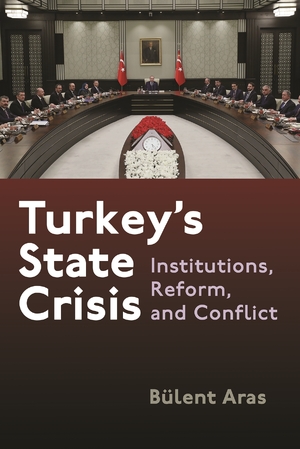"Overall, Turkey’s State Crisis is a very good historical, political, and, to some extent, geopolitical analysis of current developments in Turkey."—Middle East Journal
"Aras examines Turkey’s democratic regression from geopolitical, historical, and political perspectives.... the book will be of special interest to Turkish academics and practitioners."—Democratization
"Very interesting and valuable to students of Turkey. The book does a great job of explaining a change in civil and military bureaucracy and how the AKP was able to manage to hold to power despite so many challenges."—Ekrem Karakoç, Binghamton University, State University of New York
"A must-read, comprehensive, and accurate analysis of post-coup Turkey from the angle of the state and governance. Prof. Aras provides us with an important contribution to the academic study and public debate on democratic backsliding, securitization, and state crisis by wonderfully bringing together his past administrative expertise and his academic rigor. A terrific book for the teaching and learning of Turkish politics, as well as for think-tanks and policy makers to understand the complexities of Turkey's domestic and foreign relations."—Fuat Keyman, Sabanci University, Turkey
"Turkey's State Crisis is his brief but pointed analysis of his country's evolution under prime minister, now president, Recep Tayyip Erdoğan....Recommended especially to those involved with the Republic of Turkey, its contemporary dilemma, and its future direction."—Choice
Description
What accounts for the regression of Turkey’s stature from a “model” country to one riddled with state crisis and conflict? Unable to adapt to the challenges of the era and failing to respond to ethnic and multicultural political demands for reform, the Turkish state has resisted change and stuck to its ideological roots stemming from the 1930s.
In Turkey’s State Crisis, Aras delves into the historical, political, and geopolitical background of the country’s decline. In an effort to delineate the origin of the crisis, Aras investigates several perspectives: the political elites’ attempt to change the administrative system to create a performance-oriented one; the bureaucracy’s response, concerns, and resistance to change; the state’s conflict resolution capacity; and the transformation of foreign/security policy. Providing a comprehensive portrait of the Turkish state’s turmoil, Aras creates a blueprint for the ways in which much-needed reforms can break vicious cycles of political polarization, rising authoritarianism, and weak state institutions.
About the Author
Bülent Aras is a senior scholar and coordinator of the Conflict Resolution and Mediation stream at Istanbul Policy Center and research professor of international relations at Rensselaer Polytechnic Institute. He is coeditor of Turkey, the Arab Spring and Beyond.
6 x 9, 176 pages
January 2022

